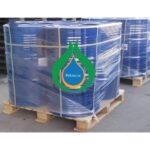Calcium Chloride in Dust Control Applications
Important: The information presented herein, while not guaranteed, was prepared by technical
personnel and is true and accurate to the best of our knowledge. NO WARRANTY OF
MERCHANTABILITY OR OF FITNESS FOR A PARTICULAR PURPOSE, OR WARRANTY OR GUARANTY
OF ANY OTHER KIND, EXPRESS OR IMPLIED, IS MADE REGARDING PERFORMANCE, SAFETY,
SUITABILITY, STABILITY OR OTHERWISE. This information is not intended to be all-inclusive as to the
manner and conditions of use, handling, storage, disposal and other factors that may involve other or
additional legal, environmental, safety or performance considerations, and OxyChem assumes no
liability whatsoever for the use of or reliance upon this information. While our technical personnel will
be happy to respond to questions, safe handling and use of the product remains the responsibility of
the customer. No suggestions for use are intended as, and nothing herein shall be construed as, a
recommendation to infringe any existing patents or to violate any Federal, State, local or foreign laws.
Occidental Chemical Corporation
A subsidiary of Occidental Petroleum Corporation Guidelines for Using Calcium Chloride in Dust Control
– Blade in the spring while road moisture content and humidity are relatively high. Water road surface prior to blading unless rain has fallen within the last two days.
Remove ruts, washboards, potholes and mix in loose aggregate.
Good drainage is essential to good performance. Shape
roads to a 4% or greater crown. Ditches, shoulders and culverts should be reshaped and cleaned as needed.
– Recommended application rates are provided in Tables 1 and 2. When applying solid products, it is usually preferable to water the surface prior to spreading the product. If the road is kept open to traffic while solid product remains on the surface, signs should be posted directing motorists to take appropriate precautions.
– Applications should not be started during heavy rainfall or if rain is threatening.
– For best performance, aggregate should meet the criteria shown in Table 3.
– During unusually long periods of hot, dry weather, water the road surface during early morning hours as needed to reconstitute the treatment. Re-apply in late summer or early fall as needed.
Frequently Asked Questions Will an unpaved road treated with calcium chloride corrode my vehicle?
Noticeable vehicle corrosion is not likely to result from driving on an unpaved surface treated with calcium chloride.
The calcium chloride tends to stay bound to the soil in the road, so there is little chance for significant contact with exposed metal on a vehicle.
Are dust control treatments with calcium chloride safe for the environment?
Calcium chloride dust control applications reduce sediment load on waterways and save thousands of tons of aggregate that otherwise would be mined from noisy and unsightly gravel quarries. Airborne particulate matter is reduced, improving regional air quality. Ground and surface waters are not likely to be impacted. While over-exposure to chloride has the potential to injure trees, this rarely occurs in dust control applications that follow current standard.




